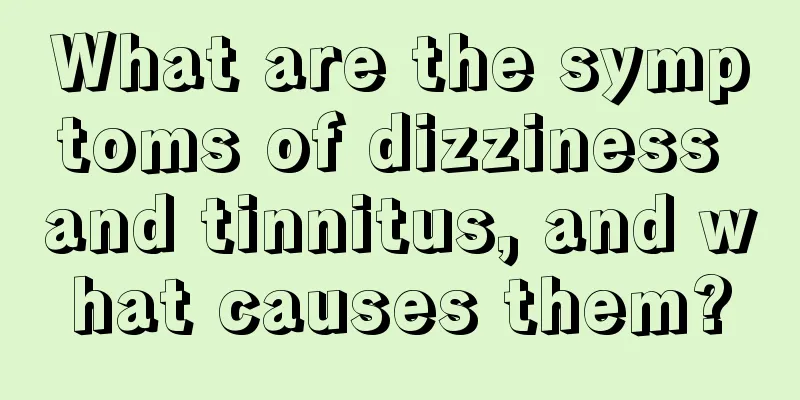What are the symptoms of dizziness and tinnitus, and what causes them?

|
If you experience dizziness and buzzing in your ears, you should pay attention, as these may be signs of physical problems. You can relax and rest for a few days to see if the condition improves. If not, you should go to the hospital for a detailed examination. Causes of dizziness Dizziness is caused by the dilation of blood vessels in the skin, increased blood flow and reduced blood flow to the brain. This phenomenon may be caused by prolonged exposure to the sun, taking a hot bath for too long, or being nervous or angry. In addition to the above reasons, vitamin deficiency, abnormal hormone secretion, menopause or autonomic nervous system disorders are also factors that cause dizziness. There are two main causes of tinnitus: one is caused by ear diseases and the other is caused by systemic diseases. 1. Otogenic tinnitus: ⑴ Lesions of the sound-transmitting part (external ear and middle ear): cerumen embolism in the external auditory canal, external auditory canal eczema, myringitis, otitis media, and Eustachian tube dysfunction. The tinnitus caused by this type of disease is generally not serious and will disappear after the cause is eliminated. ⑵ Lesions of the sensory part (inner ear): Meniere's disease, noise-induced hearing loss, ototoxic food poisoning, sudden deafness, etc. The tinnitus caused by this type of disease is more serious. ⑶ Retrocochlear lesions (acoustic nerve): Hunter syndrome, acoustic neuritis, acoustic neuropathy, acoustic neuroma. ⑷ Lesions of the auditory center (the auditory conduction pathway from the cochlear nerve nucleus to the auditory cortex of the brain): efferent nerve dysfunction, cerebral hemorrhage, dorsolateral medulla syndrome, etc. The tinnitus caused by this type of lesion is very stubborn. 2. Tinnitus caused by systemic diseases: ⑴ Cardiovascular and cerebrovascular diseases: hypertension, hypotension, anemia, coronary heart disease, arteriosclerosis, cerebral thrombosis, hemangioma, arteriovenous aneurysm. This type of disease often causes pulsating tinnitus that is consistent with the pulse. ⑵ Cervical spondylosis: cervical vertebrae A are compressed by bone hyperplasia or herniated disc. ⑶ Brain trauma or nervous system disease: head trauma, concussion, encephalitis, meningitis. This type of disease often causes tinnitus and sensorineural hearing loss with high-frequency hearing loss. |
<<: What causes tinnitus, dizziness and nausea? What diseases can cause it?
>>: How are birthmarks formed and what are the aspects
Recommend
What are the clinical examination items for liver cancer? These examinations must be done in the clinical treatment of liver cancer
First, the most commonly used method is liver ult...
What is the most serious case of teratoma
What is the most serious case of teratoma? Many t...
How to brew goat milk powder more scientifically
As people's living conditions improve, the co...
What is the reason for calf soreness
After regular running exercises, the calves are p...
Are there any misunderstandings about prostate cancer?
Recognize the misunderstanding: Eating tomato sau...
In the late stage, rectal cancer may also invade surrounding tissues and organs
In the late stage, rectal cancer may also invade ...
What are the harmful manifestations of glioma
There are many kinds of diseases nowadays. Some a...
What are the traditional health-preserving exercises
Traditional health-preserving exercise is a kind ...
Is frequent leg shaking a sign of kidney deficiency?
There are many friends around us who love to shak...
Targeted therapy for breast cancer
The so-called molecular targeted therapy means th...
How to treat anaplastic thyroid cancer? What are the clinical manifestations of anaplastic thyroid cancer?
Anaplastic thyroid cancer is a rare cancer that i...
What causes Bai Dian Madness
Vitiligo is a common skin disease. The cause of t...
What are the effects of aloe vera facial cleanser
Today's facial cleansers are no longer tradit...
How come I vomited after eating a banana
Banana is a very common fruit in our lives. It ha...
How to turn a boy’s gray hair black
How many children are worried about the white hai...









